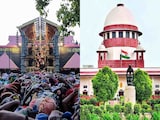India achieved freedom from the British colonial rulers after a long struggle on August 15, 1947. Today, we remember the freedom fighters who fought for our country's independence. Several notable buildings around the nation are lit up in the colours of the flag. Every year, it is marked by hoisting the national flag and singing the national anthem. People organise cultural programs and seminars to pay tribute to the freedom fighters who sacrificed their lives for India's freedom.
All eyes, however, remain fixed on Delhi's Red Fort, which serves as the venue for the annual Independence Day celebrations. The Red Fort was chosen as the site for the Independence Day celebrations for its historical significance. A symbol of the Indian independence movement is the 17th century monument which is also known as "Lal Quila." The building has seen some of the most significant turning points in the history of India's freedom movement, from being the scene of innumerable battles to serving as a symbol of resilience.
The first Prime Minister of India, Pandit Jawaharlal Nehru, hoisted the national flag and addressed the nation back in 1947. Since then, all Indian prime ministers have hoisted the national flag from the Red Fort and addressed the nation on Independence Day.
The Red Fort's infrastructure heightens the significance of the momentous occasion. Its striking architecture and towering red sandstone walls provide the ideal setting for the occasion. Ministers, dignitaries, and people from around the country attend the ceremony. The flag-hoisting ceremony and cultural performances at the Red Fort remind everyone of the sacrifices made by the great freedom fighters.
Notably, the Red Fort was built by Mughal emperor Shah Jahan. It was built to act as a fort-palace for his capital, Shahjahanabad. The Fort is regarded as the pinnacle of Mughal architecture, which reached unprecedented heights during Shah Jahan's reign. The Archaeological Survey of India is responsible for overseeing the Red Fort, which was designated as a World Heritage Site by UNESCO in 2007.















